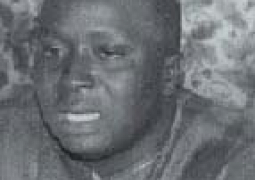
A
two-day sub-regional workshop on mainstreaming culture and interest of creative
industries into the Trade Policy of The Gambia was recently held at the
Paradise Suites Hotel.
Delivering
his keynote address, Benjamin Roberts, Minister of Tourism and Culture, said
mainstreaming culture and interest of creative industries into the trade policy
of The Gambia and other African countries is fundamental.
He thanked EU-ECOWAS Partnership for their
support to development projects in Africa.
“I
think this is what we need to do as a continent or as a sub-region,” he said,
adding that there are regional bodies that have been created as far back as
independence.
The
Tourism minister added that the initiative is right and believes they are on
the right path, while thanking the EU-ACP Partnership for their support.
Baba
Ceesay, director-general of the National Centre for Arts and Culture (NCAC), in
his welcome statement thanked the sub regional delegates for attending the
workshop.
The
workshop is all about facilitating the creativity for artists, he said, adding
that coalition is a tool that could serve its members.
He
said in this case, it is about mainstreaming the interest of the creative
community in trade policy and negotiations to make them strong.
According
to Mr Ceesay, the workshop is important to them, and the Ministry’s strategic
plan and vision is to move the creative community of The Gambia to higher
heights.
Also
speaking at the workshop was Babatunde Obalana, FTA, president National Association of Nigeria
Theater Arts Practitioners (NANTAP), who said The Gambia is a beautiful place
to stay, and culture is a way of life.
He
added that the Americans and the British over the years have served democracy,
and the Chinese have made it very successful in selling their goods to other
parts of the world.
“We
would also talk about the talents of our people and to showcase them to the
world, and let people appreciate what we have as an Africans and as cultural
experts who believe what we have.
“I
believe that the forum is going to set the agenda so we need to challenge
ourselves on what we are doing, as well as to ensure that our cultural policies
are being propagated,” he added.
Vesta
Adu Gyamfi, director of the Centre for Cultural and African Studies (CeCast),
Kwame Nkrumah University of Science and Technology in Ghana, said there could
not be people without culture and there could not be culture without people.
“We
were created by God to create culture and we are identified by cultural
beliefs. Cultural life is the way we do things, the way we analyse things, and
without that we are nowhere,” he said.
God
created man and man created culture through his daily activities, he added.
The
first phase of the project involved a needs assessment study of the policy
regulatory institutional framework, and capacity needs in enhancing and
development of the culture and arts sector under the EU-ECOWAS Partnership
Agreement; and the second phase of the project aims to bring together culture
practitioners of ECOWAS and other ACP.



